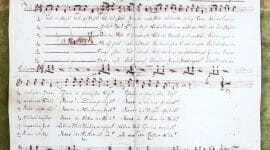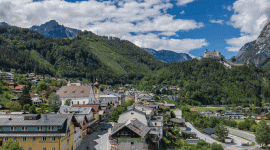
“Where language ends, music begins” — this remark by Hugo von Hofmannsthal could function as an excellent and subtle reasoning for the creation of the song “Silent Night”. During a time of utter desperation, Joseph Mohr gifted a poem to the poverty-stricken population. The poem and his own uninterrupted belief were the most precious gift that the young assistant priest could make to a population that was so desperate for hope. They were hungry, deeply in debt and lacked any perspective. On Christmas in 1818, Europe had been in crisis for decades: Napoleon’s campaigns of conquest and revolution had put formerly allied neighbouring countries at war. French army corps besieged the area for months and new borders tore relations, cities and families apart.
Austria during the Napoleonic Wars
Salzburg was particularly affected by the political reshuffling: For centuries, it had been an independent, clerical and affluent Archbishopric under the rule of the Archbishops of Salzburg, but by 1800 the land was occupied by the French and then secularised in 1803. First, it was passed on to Ferdinand III of the Habsburg family as a secular electorate, then, from 1805, following repeated occupation by the French, to Bavaria with several partitions, and then finally to the Habsburg Monarchy.
Tirol, which had been a relatively independent part of the Austrian Empire and a princely earldom, was also occupied by the French, becoming part of the Kingdom of Bavaria, which was allied with Napoleon, in 1805. What followed was as legendary as it was bloody: The Tirolean Rebellion of 1809 under Andreas Hofer against the French and their allies. The Bavarian part of Tirol was only returned to Austria in 1814.
The Innviertel region had been part of the Duchy of Bavaria for centuries and only fell to Austria in 1779 as a result of the War of the Bavarian Succession and following the Treaty of Teschen. The Coalition Wars transformed Upper Austria into a battlefield for years and it had to accept several occupations and cede territories. Although the warring parties had already agreed to return the Innviertel and western Hausruckviertel regions to Austria in 1814, the transfer took until 1816.
Bitter consequences wherever one looked
The Congress of Vienna of 1814/1815 sealed the end of the Napoleonic era. On 1 May 1816, Salzburg finally fell to Austria as a result of the Treaty of Munich. However, not as an independent part of the Habsburg Empire, but as a district of the Archduchy “Österreich ob der Enns” and administered from Linz. The arrangement lasted until 1850. The valleys of Zillertal and Brixental, part of Salzburg for centuries, were now part of Tirol. The name of Salzburg was cleared off the map. The once magnificent residential city was degenerating into an unknown district town. Officials began leaving the city and the population decreased from 16,000 to only 12,000.
Tirol and Upper Austria may have remained unaffected by territorial losses. Nevertheless, the war, with its many side effects like plunder, forced deportation and reparation payments, left only misery behind.
Following the war came the devastating “Year Without a Summer”
In 1816, the Austrian and Bavarian populations fell victim to a natural catastrophe they had never seen before. A gigantic volcano eruption in April 1815 on a small Indonesian island triggered dramatic climate changes across continental Europe one year later: Around the world, average temperatures fell by one to two degrees. The harvest withered away in the never-ending rain and summer-time snowfall. Especially the farmers of Salzburg, Tirol and Upper Austria had to carry the burden. In light of the failed harvests and famines, the farmers fell into despair and apathy. People perceived the catastrophe as “punishment from God”. The year 1816 went down in history as the “Year Without a Summer”.
The people starved and searched for new income opportunities
In 1818, a disastrous fire in the city of Salzburg destroyed 93 buildings, as a result of which 1,000 people lost their livelihoods. The situation on the fields had become a disaster: The farmers in Upper Austria, who, like Franz Xaver Gruber’s family, had been earning additional income through weaving, lost their supporting leg with the invention of the mechanical loom in 1786. In the barren mountain landscape of Tirol, overpopulated since the 16th century, more farmers than travelling merchants had to head out to make a living, sending their children to work in Germany and Switzerland or even emigrating completely.
“Silent Night” provided comfort and solace to a traumatised public
The Upper Austrian Franz Xaver Gruber, a teacher in Arnsdorf, and Joseph Mohr from Salzburg, assistant priest in Oberndorf, both grew up in simple circumstances and experienced the misery first-hand. From a young age, both of them understood the ability of music to soothe the soul. Oberndorf was hit particularly hard by the changes: The Treaty of Munich ceded the Rupertiwinkel region in the northwest of Salzburg to Bavaria. Laufen near the Salzach river was torn apart. The town centre, with all its important facilities, continued to belong to Bavaria, whereas Oberndorf on the periphery went to Salzburg. A dramatic situation for Oberndorf, which now had neither a cemetery nor a school. And neither did it have an administrative centre. What once used to be the region’s lifeline — the Salzach river — had become a separating border river.













